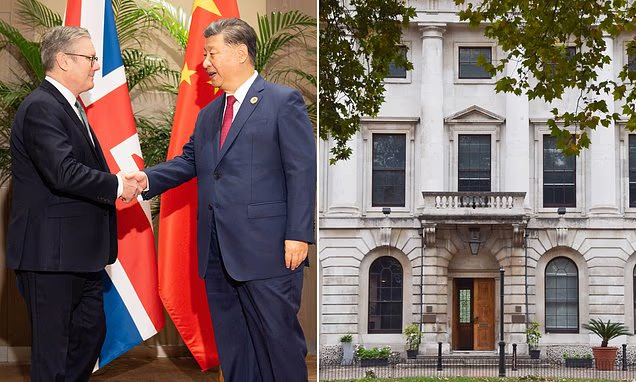MI5 has issued an ‘espionage alert’ to the UK Parliament amid mounting concerns over Chinese intelligence activities targeting British democratic institutions. The warning, circulated on Tuesday morning by Commons Speaker Sir Lindsay Hoyle, reveals that individuals linked to China’s Ministry of State Security (MSS) have been attempting to build long-term relationships with MPs, parliamentary aides and officials working across the devolved governments.
According to the Security Service, the MSS has been covertly using civilian intermediaries to approach political figures through professional networking platforms, particularly LinkedIn. The alert specifically identifies two women Amanda Qiu, chief executive of BR-YR Executive Search, and Shirly Shen, co-founder of the Internship Union, who are alleged to have acted as recruitment conduits on behalf of the MSS.
Though not believed to be intelligence officers themselves, MI5 says both women “conduct outreach at scale” using polished recruitment profiles designed to establish trust with officials, extract information, and lay the groundwork for potential future influence operations.
Targeted and Widespread MI5 Activities
In his letter to MPs, Sir Lindsay stressed that the alert was not prompted by a single event but by ongoing activity considered “targeted and widespread.”
“The Chinese Ministry of State Security is actively reaching out to individuals in our community,”
Sir Lindsay wrote. “Their aim is to collect information and lay the groundwork for long-term relationships, using professional networking sites, recruitment agents and consultants acting on their behalf.”
He urged MPs and their staff to familiarise themselves with newly issued Parliamentary Security Department guidance on spotting suspicious profiles and managing digital risk. He also encouraged anyone who believes they may have been contacted by the individuals named to report the approach immediately.
MI5’s warning emphasises that Chinese intelligence efforts do not discriminate, meaning MPs, their staff, parliamentary researchers, and officials across Scotland, Wales and Northern Ireland are all potential targets. The MSS, the agency said, is intent on cultivating relationships that could later be leveraged for political insight or covert influence.
Read Also:
Downing Street urges labour MPs to back asylum reforms
MI5 chief McCallum warns China poses daily threat to UK security
Evidence revealed Amanda Qiu’s LinkedIn activity found she maintains a notable network of high-profile British contacts. They include officials in central Government departments, policy advisers, consultants working with Westminster public affairs firms, and individuals connected to top political think tanks such as the Tony Blair Institute.
Among her connections are civil servants at the Treasury, staff at the Department for Science, Innovation and Technology (DSIT), political advisers in Parliament, and former special advisers to senior Cabinet ministers. Sir Lindsay noted that “other similar profiles” beyond Qiu and Shen are also believed to be operating as espionage fronts.
Collapsed Espionage Case Fuels Concerns
The alert follows the dramatic collapse in September of a high-profile espionage prosecution involving two men accused of passing information from Parliament to Beijing.
Christopher Cash, 30, and Christopher Berry, 33, had both denied charges under the Official Secrets Act. The Crown Prosecution Service ultimately abandoned the case after the Government’s key witness declined to describe China as a threat to British national security—an explicit legal requirement needed to proceed.
The decision provoked frustration within the intelligence and national security community, where many officials believe Chinese infiltration efforts across the UK’s political and academic institutions have become increasingly bold.
Labour expressed disappointment at the failed prosecution, blaming the previous Conservative administration for not formally designating China as a national security threat during the period the alleged offences took place.
Responding to growing alarm in Westminster, Security Minister Dan Jarvis on Tuesday announced a new package of measures designed to disrupt and deter hostile state actors.
Addressing MPs, he said the Government is preparing fresh powers to counter foreign interference, including: A “proscription-type” tool to block proxy groups working on behalf of hostile states, increased penalties for election interference offences, protective security campaigns coordinated by the Defending Democracy Taskforce, training to help political staff “recognise, resist and report” suspicious behaviour
The measures come as the Labour Government attempts to balance national security concerns with ongoing diplomatic engagement with Beijing. Chancellor Rachel Reeves travelled to China in January, and National Security Adviser Jonathan Powell visited Beijing in July for discussions on strengthening bilateral ties.
Espionage alerts of this nature are highly unusual. The last publicly disclosed notice came in 2022, when MI5 warned MPs that alleged Chinese agent Christine Lee had covertly influenced political decision-making by cultivating ties with a Labour MP. China denied the allegations, and Lee insisted she was acting only to promote diversity and represent British-Chinese communities.
The new alert underscores MI5’s growing unease about Beijing’s escalating intelligence presence in the UK. For Parliament, Sir Lindsay said, the responsibility is shared:
“It is of the utmost importance that we all understand how this activity happens and how to protect ourselves against it. We all have a responsibility to keep Parliament safe.”
As the UK grapples with intensifying geopolitical rivalry and digital-age espionage, MI5’s latest warning signals that the frontline of foreign interference is no longer confined to shadowy corners—it is now unfolding across everyday professional networks.



